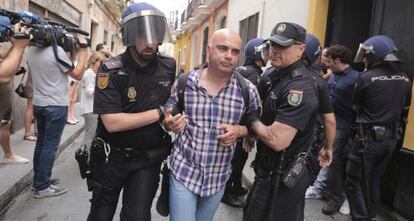Amnesty International Spain decries lack of action against housing crisis
There have been more than 600,000 foreclosures since the economic downturn began Local authorities have sold off subsidized housing to investment funds in Madrid


The scene has played out repeatedly all over Spain since recent municipal elections: councilors and mayors from leftist coalitions mediating in home evictions.
“This is what it means to be everyone’s mayor,” said José María González, the new head of Cádiz, after trying to stop a family of tenants from being evicted from their low-rent home earlier this week.
Spain has nearly 30 percent of all the empty homes in Europe, but the authorities have not used these units
On the same day that the Podemos-backed González made that statement, the Spanish branch of Amnesty International (AI) released a new report on the country’s housing situation.
The report lambastes Spanish authorities for their attitude to the housing problem throughout the economic crisis, which saw many people losing their jobs in a country with very high home ownership rates (around 77 percent), a fact that led to numerous mortgage defaults and foreclosures.
“They have failed to meet all their international obligations with regard to the right to housing,” said Esteban Beltrán, director of AI Spain, during the presentation.
“The bank went after my parents”
Ainhoa Lafuente’s woes began in 2009. In 2005, when she still had a steady job as a clerk at a decoration store in Terrassa (Barcelona), she bought an apartment. The bank financed 100 percent of the €157,000 loan. She met her payments until 2013, despite having lost her job four years earlier, finding another one in 2010 that only lasted a year, and joining the ranks of the unemployed.
Now a mother of a three-year-old child, on Monday Lafuente managed to negotiate with the bank to return the keys to the apartment in return for canceling her debt. “I had to pay €4,500, though. The owed amount was over €200,000 after having paid €50,000.”
“During the negotiation, the bank not only wanted my home, they also wanted my parents’, because we had used it as collateral. It’s a subsidized home that they’re still paying for,” she explains. “And they wanted it despite the fact that my father had a stroke and my mother had surgery for breast cancer.”
“People like myself, who have nothing left, are tired,” she says. “All I want to do is work. Why do they think I stopped paying the mortgage in 2013? To be able to feed my little girl a piece of bread.”
The study shows that there have been more than 600,000 foreclosures in Spain since 2008, the year that the crisis began. Of these, between 2012 and mid-2014 alone, nearly 100,000 affected primary residences.
“Many authorities in Spain do not see housing as a human right but as a consumer good. That is the essential root of this problem,” said Beltrán.
Koldo Casla, the author of the report, said that government housing policies have led to a “regression” – spending on social housing fell more than 50 percent in the national budget between 2009 and 2014.
According to Derechos desalojados (or, Evicted rights), Spain’s subsidized housing only represents 1.1 percent of the total, which is only higher than Greece. By comparison, these homes represent 32 percent of all housing in The Netherlands, 23 percent in Austria, 18 percent in Britain and 17 percent in France.
Another salient feature about Spain is that it has nearly 30 percent of all the empty homes in Europe. The report notes that regional and central authorities have not worked to make good use of these units, as recommended in 2008 by the United Nations Special Rapporteur.
Additionally, in recent years many buildings containing subsidized homes have been sold off to investment funds – nearly 5,000 in the Madrid region and close to 400 in Catalonia, the study finds.
“It would be difficult to find another human rights violation in Spain that is so extended and so invisible,” said Esteban Beltrán, noting that Spanish authorities have ignored international recommendations for the creation of mediation tools.
Tu suscripción se está usando en otro dispositivo
¿Quieres añadir otro usuario a tu suscripción?
Si continúas leyendo en este dispositivo, no se podrá leer en el otro.
FlechaTu suscripción se está usando en otro dispositivo y solo puedes acceder a EL PAÍS desde un dispositivo a la vez.
Si quieres compartir tu cuenta, cambia tu suscripción a la modalidad Premium, así podrás añadir otro usuario. Cada uno accederá con su propia cuenta de email, lo que os permitirá personalizar vuestra experiencia en EL PAÍS.
¿Tienes una suscripción de empresa? Accede aquí para contratar más cuentas.
En el caso de no saber quién está usando tu cuenta, te recomendamos cambiar tu contraseña aquí.
Si decides continuar compartiendo tu cuenta, este mensaje se mostrará en tu dispositivo y en el de la otra persona que está usando tu cuenta de forma indefinida, afectando a tu experiencia de lectura. Puedes consultar aquí los términos y condiciones de la suscripción digital.








































